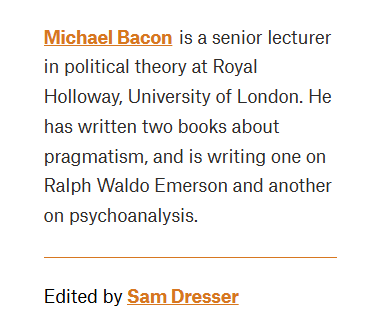To resist dogma and accept uncertainty, think like a pragmatist

Founded in 19th-century America, the philosophy of pragmatism promises imaginative ways of coping with our circumstances
https://psyche.co/ideas/to-resist-dogma-and-accept-uncertainty-think-like-a-pragmatist

Montana, USA; 2000. Photo by Peter Marlow/Magnum

In the everyday sense of the term, the pragmatist is the person who ‘gets results’. The term can be intended as either a compliment or a criticism; it can be applied equally to effective and to unscrupulous managers and politicians. These connotations carry over, typically in misleading ways, into the philosophical sense of pragmatism.
Pragmatism is the United States’ most important contribution to philosophy, emerging in the late 19th century, developing throughout the 20th, and flourishing today. At its heart is a rejection of what one of its founders, John Dewey (1859-1952), calls ‘the spectator theory of knowledge’. This theory, which can be traced to Plato, holds that reality is composed of two discrete entities: the world of objects, which exist independently of us, and the minds, which perceive and seek accurately to represent that world. In the alternative account offered by pragmatists, the mind is, rather, a part of the world, in which it plays an active role. Pragmatists, accordingly, describe us not as seeking to represent reality as it exists independently of us, but rather as developing more effective and imaginative ways of coping with the circumstances in which we find ourselves.
Pragmatists take up some of the questions that have been central to the Western philosophical tradition: what is truth? What is objectivity? How might these be discovered or achieved? How should our political and social lives be structured? They find answers not in some supposedly transcendental realm, but as growing out of and remaining firmly rooted in our concrete dealings with the world. In the words of another of its founders, William James (1842-1910): ‘The trail of the human serpent is … over everything.’
Pragmatism offers answers to many of the questions that have interested philosophers since Plato. There is, though, no single programme or set of tenets around which every pragmatist unites, and the tradition contains very different and sometimes conflicting ideas. In what follows, I set out some ideas that I think are particularly useful.
snip
Bernardo de La Paz
(55,104 posts)It is an all too common simplistic and very shallow kind of remark.
It is symptomatic of a world view that insists on purity tests and loyalty tests. Fundamentally it is binary thinking; the False Dichotomy logical fallacy. The world is full of nuance and shades of grey and degrees of things and gradations. It is a false choice. It is the most pernicious of all logical fallacies and the most common. It is the kind of thinking that scientists and engineers and doctors avoid. Scientists rarely speak in certainties but explain the limits of the data and the theory. Doctors don't say "you're a goner" but rather things like "If you do A and B you will greatly improve your chance of living more than six months". (Of course there are many exceptions.)
You can avoid it too, if you set your mind to it. ("You" being used in the plural, general sense, address all who are prone to it.) It is easy to stop that kind of thinking if you become aware of it and notice it every time you use it and every time you see others use it. Look for it. Train yourself.
I dread the torrent of "He blinked" remarks forthcoming against Prime Minister Dr. Mark Carney, D.Phil. Oxford, B.A. Harvard, when he negotiates some kind of resolution to the tariffs. Probably a NAFTA 3.0 (CUSMA 2.0), similar to what previous pragmatic Canadian Prime Ministers negotiated.
Pragmatism is NOT a sign of weakness. It is one thing to say tRump blinked because he is fundamentally a weak sack of shit with no vision and no strategic understanding and no thought out plan. tRump is not pragmatic or rational. He is reactive and emotional.
Let's not apply the slur against intelligent caring pragmatic leaders like Carney who are facing a challenge that would make 99.9% of DU members quake in their boots because of the weight of the responsibility.